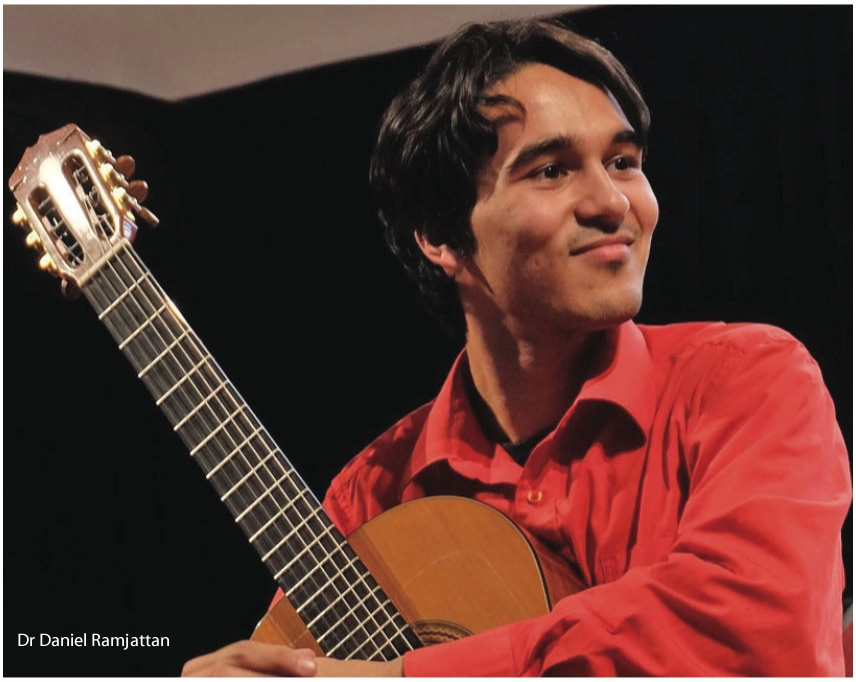If it appears that anxiety is a growing health statistic – it is. In September 2022, the US Preventive Services Task Force issued a draft recommendation urging all adults under the age of 65 to be screened for anxiety. Some career choices can exacerbate anxiety, and anyone who has ever faced stage fright would understand that musicians face anxiety far more frequently in their work than in many other fields of endeavour.

On September 22, the ANSA McAL Psychological Research Centre, in collaboration with the Department of Creative and Festival Arts (DCFA), hosted Dr Daniel Ramjattan for a virtual seminar on Music Performance and Anxiety (MPA). The seminar brought musicians, students and media members together with other members of the campus community for a theoretical understanding of MPA and some practical ways to deal with it.
Dr Ramjattan is a Doctor of Musical Arts at the University of Toronto, an Instructor at Wilfrid Laurier University in Canada, and a classically trained guitarist. He is Canadian but also a second-generation Trinbagonian. Dr Ramjattan received the University of Toronto New College's Senior Doctoral Fellowship in 2021-2022 for his research into cognitive-behavioral psychology for managing MPA amongst guitarists. He shared several explanations and insights into MPA gleaned from his studies.
“Music Performance Anxiety is defined as the presence of persisting, distressing apprehension, and/or actual impairment of performance skills in a public context, to a degree unwarranted given the individual's musical aptitude, training, and level of preparation,” (Salmon, 1990, pg. 3) he detailed in his presentation slides.
Dr Ramjattan likened it to the sports phenomenon of “choking under pressure” though it is more commonly referred to as “stage fright” by musicians. He pointed out that when creatives and musicians enjoy their work, they refer to it as “flow”. MPA can be considered negative arousal and the opposite of flow.
“Flow is a kind of rapturous feeling that we get where we feel we could not make a mistake if we tried. With MPA, it's the other end of the spectrum. No matter how prepared we are, we feel anxious. And this happens at several levels, creating three levels of symptoms. There are physiological symptoms such as tachycardia (higher heart beats per minute) or sweaty hands. There are cognitive symptoms like difficulty focusing, and also behavioural symptoms such as over eating or under eating, over practising or under practising and of course, substance abuse as a coping mechanism.”
Dr Ramjattan also led virtual attendees on a shortened breathing and meditation exercise to retrain and refocus the mind via daily practice or before a performance.
Mr Jessel Murray, Senior Lecturer of Music Arts and Head of the Department of Creative and Festival Arts (DCFA), noted that his department is keen to continue this learning modality.
"This seminar was a welcome addition to the support needed for students in our performance activities, especially those who are solo performers. It was the perfect complement to the DCFA Music Unit's Performance Ready series which stopped due to the migration to online course delivery. Dr Ramjattan had an earthy and humorous approach to his presentation that allowed for the processing of this matter that bedevils so many students. The Department has already petitioned the ANSA McAL Psychological Research Centre for follow-up sessions," he said.
Established at the St Augustine campus through the ANSA McAL Foundation, the Psychological Research Centre has conducted several national research projects on social norms and values, gambling, and crime victimisation, and has undertaken numerous surveys and polls for many agencies. The Centre also collaborates with researchers regionally and internationally, and has been hosting virtual seminars, including a webinar in 2021 on Family Violence.
Derek Chadee, Professor of Social Psychology and Director of the ANSA McAL Psychological Research Centre, noted that Dr Ramjattan is a “pracademic” or a practising musician and academic, and that he was able to use the “discipline of psychology to understand the dynamics of performance anxiety in musicians”.
"The ANSA McAL Psychological Research Centre was happy to host this seminar with the DCFA. The blend between psychology and other disciplines brings a refined understanding and analysis of behaviour. Dr Daniel Ramjattan's presentation is a case in point. The ANSA McAL Psychological Research Centre, as part of its remit, will continue to explore multidisciplinary approaches to understanding and analysing important issues and problems."